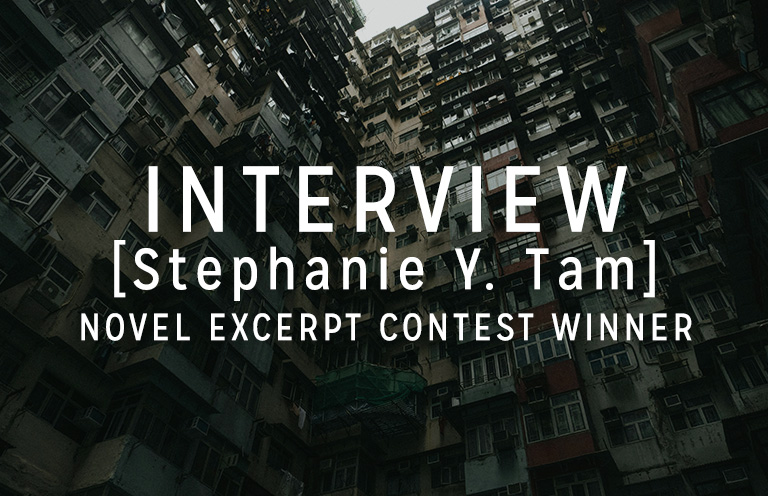Stephanie Y. Tam’s “The Translated City” won 2nd Place in our Novel Excerpt Contest. Once you read it, you’ll want to read the rest of the novel! In the meantime, check out this interview in which Tam talks about the duality of language, the bending of reality, and the loneliness of writing.

A lot of the tension in these pages comes from duality of meaning in words and phrases. Can you talk about the origin of that—was it always part of the story or did it evolve as you wrote?
It was in the DNA of the story from the start, but it also evolved over time.
As someone who has grown up between worlds, I’m very interested in what gets lost in translation—across cultures, generations, and languages. My writing of the two sisters drew from my childhood experience of navigating tensions between Chinese and American cultures; first- and second-generation expectations; and Cantonese and English. Cantonese is notoriously hazardous for ABCs, because its intricate tonality makes it easy to mean one thing and say something else entirely, often to comical effect (like accidentally telling someone your aunt lives in a dragon’s cock, instead of Kowloon). I wanted to play with those elements of humor and disaster embedded in my mother tongue, the possibilities and perils of language.
What’s lost in translation also emerged as a theme in my research. The working title of the novel, The Translated City, came from a fascinating detail I discovered about how the colloquial name for the Walled City of Kowloon arose from a “poor translation” by the British colonizers; it seemed the perfect metaphor for how the seeds of misunderstanding would erupt into violent politics later on—a hidden history thread that intertwines with the unfolding family mystery.
On the one hand, the scenes presented here are grounded in details, making them tangible and real. On the other, there’s a magical, surreal quality to things that happen. Can you talk about balancing the real and magical?
I love a twist of strange, because it feels true to the reality of mystery and wonder in the world—especially that of a child. In one sense, that balance is a natural part of that childlike headspace, where the disappearance of a parent feels more earth-shattering than the appearance of a ghost. But I also try to make my strangeness specific—as detailed as the tang of sweat, or the sway of the sea—so that it feels believable.
That blend of magical and real also reflects the invisible realities of the world: How past trauma can rupture the present, how spirits and demons are active in many cultures, and how we construct reality based on the stories we tell ourselves.
Belief is probably the key word here, because how we perceive the world (what is real or magical) depends largely on our beliefs. That’s played out in the growing divide between the two sisters, one of whom inclines towards natural explanations, and the other of whom is more attuned to the supernatural—the latter not so much because she believes that ghosts are real, but because she believes in her parents.
The footnotes you employ are an unusual device. What do you feel like they add to the story?
This is a story interested in storytelling, oral histories, and myth-making (of both the personal and political variety). Footnotes enabled me to introduced a meta-layer to reflect on those storytelling processes. In nonfiction, footnotes tend to offer facts: definitions, explanations, citations. I was interested in using them a little differently here: playing with the idea that facts contain fictions. Instead of using a footnote to simply define a Cantonese word in English, I wanted to flesh out multiple interpretations and the slipperiness of translation itself—which also reflects what it means to come of age as the child of immigrants, like my narrator, Sam.
Basically, I’m a nerd, so footnotes gave me the space to explore my curiosity without interrupting the narrative flow—but I get they’re not for everyone, so you can just as easily skip over them!
The pages here are an excerpt from a larger novel. Tell us where that is in terms of done-ness.
I’ve been working on this story on-and-off for almost six years, while juggling my work as a radio/podcast producer and all the other things that fill a life. I have several drafts and multiple versions in varying states of done-ness, but the thing on the page still feels not quite the vision in my head. I would dearly love to find an editor/publisher who can help me bring it to completion.
And, finally, what’s your writing routine like? Do you try to work at a set time every day or just when inspiration strikes?
I’ve been working on “my writing routine” for even longer than I’ve been working on this novel. The short answer is that I go through different seasons. I’m not a morning person, and I will never be that person who gets up at the crack of dawn to write for hours before the day begins. But I do work well with a degree of structure, so it helps to set aside a couple of hours a day, or even better a week-long retreat, and I keep a writing timesheet and journal to log my hours and reflect on my process.
I definitely don’t wait for inspiration to strike, because that would be few and far between; I also find that inspiration tends to strike more often when I’m writing regularly, and usually in the background—on a walk, in the shower, or as I’m falling asleep.
Writing is hard and lonely, so anything that can ease that helps. I find “writing buddy dates” and deadlines to be a motivating combination, whether that’s a goal of 10,000 words by the end of the month, or a writing submission deadline (like a novel excerpt competition!).
Interviewed by Jen Dupree
